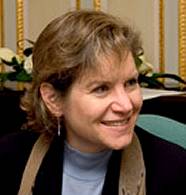The Bush administration is moving ahead with plans to establish a free trade agreement with Oman, despite the controversy over a deal giving a company in the United Arab Emirates significant control over six U.S. ports in the United States.

Deputy U.S. Trade Representative Susan Schwab says the free trade agreement - or FTA - will benefit workers in the United States and in Oman:
"The FTA will provide new market access opportunities for U.S. farmers, manufacturers, service providers, workers," said Susan Schwab. "It will also help to create an economic environment conducive to additional employment opportunities for the people of Oman."
Schwab made her comments before the Senate Finance Committee Monday, in the wake of an uproar over the Bush administration's approval of a deal to allow a company in the United Arab Emirates to operate terminals at six U.S. ports.
The administration has been accused of undermining national security by allowing the state-owned Dubai Ports World to take over significant operations at the ports. The controversy prompted the company to agree to a 45-day security review to allay concerns, although a growing number of U.S. lawmakers are calling for deal to be canceled.
The administration says the ports deal would not harm national security, and neither would a U.S.-Oman trade agreement. Deputy Trade Representative Schwab:
"As you know, whether it is through the World Trade Organization, the WTO agreement, or any of our free trade agreements, there are specific provisions where there are exceptions for essential security," she said. "No country would give up its ability to protect its own national security, and that is indeed the case with this agreement as well."
Schwab said the trade agreement would help support economic, political and social reforms in Oman, which she described as a key U.S. ally in the war on terrorism.
She said promoting trade is a key part of President Bush's vision for developing economic growth and democracy in the Middle East.
Edward Walker, President of the Middle East Institute and a former U.S. ambassador to the UAE, Egypt and Israel, agrees. He says the trade pact will help diversity Oman's economy and help promote stability.
"The problem Oman faces is that its oil reserves are decreasing while its population is increasing," said Edward Walker. "In the absence of economic diversification, Oman will face increasing problems in fulfilling the needs of its citizens, which may well lead to destabilizing trends in the society, trends that could work against U.S. interests. By anyone's reckoning, Omani reserves at current rates of production will be depleted in 16 to 22 years."
Like other free trade agreements the United States has brokered with other nations, the U.S. Congress will have to ratify this pact. And like previous trade accords, labor groups and their congressional allies are concerned about an erosion of U.S. workers' rights under this deal.
Thea Lee is policy director for legislation for the labor federation known as the AFL-CIO:
"Our argument has been that the worker rights provision in this agreement is entirely inadequate to ensure that workers human rights are respected," said Thea Lee.
Deputy Trade Representative Schwab argues otherwise, saying there are labor protections in the trade agreement.
David Hamod, president of the National U.S.-Arab Chamber of Commerce, notes that U.S. trade with Oman has been on the increase:
"According to our chamber's forecast for 2006, U.S. merchandise exports to Oman are on track to reach nearly $1 billion this year, which translates into more than 15,000 direct U.S. jobs," said David Hamod. "The 2006 figures represent an increase of nearly 56 percent over 2005, when U.S. merchandise exports totaled $593 million. The U.S. has become the third largest exporter to Oman behind the UAE and Japan."
The United States' effort to forge a trade accord with Oman is part of Washington's plans to establish a regional free trade agreement in the Middle East by 2013. It already has free-trade pacts with Jordan, Morocco, Bahrain and Israel.